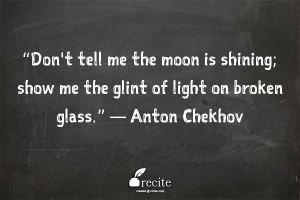Show, Don't Tell

A familiar axiom of writing is “show, don’t tell”. We hear it everywhere: from teachers, in articles, in writing workshops. For a long time, I had no idea what it actually meant. What do you mean, don’t tell? Aren’t we storytellers? My natural inclination was to sit down and tell what happened; hovering above my characters like an omniscient narrator explaining exactly how they felt and why they felt it. After all, how would the reader know if I didn’t tell her? Many terrible drafts later, I have come to learn a little bit about point of view, the embodied experience, and how to let the reader feel what is happening along with the character.
In the spirit of showing…
When I looked up from the keyboard, I saw him. I wished I were anywhere but a bookstore in the middle of Baltimore. I hadn’t considered that he might be the one I’d run into. I was so nervous that my hand shook when I picked up my coffee cup. Swallowing the cold remains in one sip, I finished the stale tasting liquid.
“Jeff.” Calling, as I might to any old friend.
He stopped, looking surprised, as he walked over to the table.
I stood up and before I knew what was happening, he swept me into his arms. He still smelled the same and I thought about the last time I had seen him. For a moment everything around me dissolved, and it was just the two of us, the way it used to be. He let go, and I felt wobbly.
VERSUS
When I looked up from the keyboard, I saw him. Sweat broke out on the back of my neck, and I wished I were anywhere but a bookstore in the middle of Baltimore. I hadn’t considered that he might be the one I’d run into. My pulse raced and I reached a trembling hand to my coffee cup. Swallowing the cold remains in one sip, I recoiled at the taste of the stale liquid.
“Jeff.” Calling, as I might to any old friend.
He stopped, his eyes growing wide as he walked over to the table.
I stood up and before I knew what was happening, he swept me into his arms. At once, the familiar scent of sandalwood overwhelmed me, and I ricocheted back in time, reeling from the familiarity of his feel and his smell. For a moment everything around me dissolved, and it was just the two of us, the way it used to be. He let go, and I put a hand on the chair behind me to steady myself.
I don’t worry so much about this in my first drafts—it would be too crippling. It’s in revision that I keep a keen eye out for those passages where I’ve bogged down the narrative with too much explaining. Emotions words jump out at me, and I work hard to show someone’s anger or fear rather than just naming it. There are other places where showing is superior—listing a character’s quirks or talents for instance. If I can show how my hero eludes a pursuer during a car chase rather than say he’s an excellent driver, the experience will be more satisfying and believable for the reader.
Take a look at one of your passages and see if there is a way to envelop your reader more viscerally into the experience. Feel free to post your own examples in the comments.